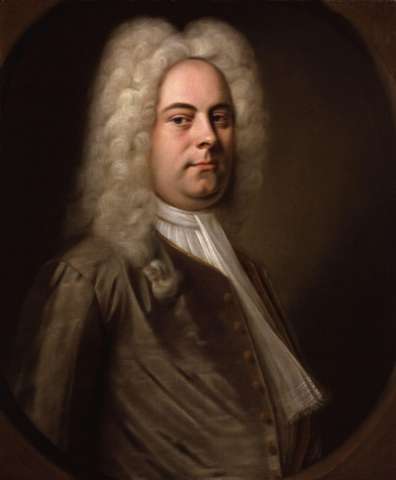
Handel was born in 1685 in the Saxon town of Halle, but he became an English citizen and died in London in 1759. He enjoyed success in several different countries and his musical style ranged accordingly, from Italian opera to the German suite and the English anthem, from the concerto grosso to the royal birthday ode.
A deep interest in opera drew Handel first to Hamburg and then in 1706 to Italy, in order to study the genre at source and thus be able to develop his creative talent. In Venice his Agrippina (1709) was enthusiastically acclaimed, receiving 27 performances before he returned to Germany to become Kapellmeister to the Elector of Hanover. But opera remained his first love, and it was the chance to renew his involvement with the theatre which soon drew him to London, where his opera Rinaldo was produced in 1711.
From the time Handel settled in England in 1712, his achievement was such that he attained a position of some eminence in the cultural life of the nation. The accession in 1714 of his former employer, the Elector Georg Ludwig of Hanover, to the English throne as George I might have been an embarrassment, had not the King recognised both Handel's genius and the fact that a fellow German-speaker would be useful to him in London society.
As early as 1713, for instance, Handel provided a Birthday Ode for Queen Anne and a Te Deum and Jubilate to celebrate the peace of Utrecht, while ten years later he wrote his impressive set of four Coronation Anthems for the new King George II. One of these, Zadok the Priest, has been performed at every subsequent coronation. Handel's role as 'composer laureate', moreover, continued for the rest of his life.
In 1717 Handel entered the service of James Brydges, soon to be created Duke of Chandos, at his lavish home Cannons at Edgware. There he wrote anthems and dramatic music, such as the oratorio Esther and the pastoral opera Acis and Galatea, both to English words. He also turned to instrumental sonatas and suites, writing trio sonatas and keyboard music of enduring value.
In 1719 a Royal Academy of Music was created by wealthy enthusiasts in order to promote Italian opera. Handel was appointed its musical director and was involved in every aspect of the operation, even traveling to Europe to recruit singers. The next few years were prolific indeed, with operatic masterpieces such as Radamisto, Ottone, Giulio Cesare, Rodelinda, Tamerlano and Admeto. Thanks to Handel London had become the operatic capital of Europe.
In nearly forty operas Handel allowed the structure and virtuosity of opera seria to be moulded into a musical language of truly human dimensions. However, as time passed public support proved fickle and in 1729 the Academy venture collapsed, to be replaced by a new company at Covent Garden, replete with with singers recruited from Italy. There is no question that Handel was the greatest musical cosmopolitan of the day: a German composer, living in London, and writing Italian operas. In these operas there are relatively few ensembles and choruses. Dialogue takes place in lightly accompanied recitatives, but the arias are supremely rich and varied, strongly characterised while offering abundant opportunities for vocal virtuosity. The star singers were highly paid entertainers with international reputations, including castrati such as Caffarelli (real name Gaetano Majorano).
When during the 1730s this type of opera became unfashionable, Handel renewed his career by successfully creating a new genre for performance in the theatre, the oratorio in English on Biblical texts. These oratorios became hugely popular and they also contain some wonderful music. The majority are based on tales from the Old Testament: Samson, Belshazar, Joshua, Solomon and Saul, for example. The most successful has of course been Messiah (1742), which has become a veritable institution in our national life, performed year on year, and much more frequently than the remainder put together. At these oratorio performances, Handel included interval performances of concertos, sometimes featuring himself as organ soloist. His greatest achievement in the field was his set of twelve concerti grossi, Opus 6 (1739), which he composed at the suggestion of his publisher John Walsh. These are among the great instrumental works of the baroque era and, typically, they frequently employ music borrowed from earlier compositions as well as new material.
During the 1750s Handel’s health and eyesight deteriorated, until he went blind. He died on 14th April 1759 and was buried in Westminster Abbey. Among contemporary composers his mastery was equalled only by Bach; but in opera he was without peer, the outstanding opera composer during the entire period between Monteverdi and Mozart.
© Terry Barfoot/BBC
Schneider portrait of Handel reproduced by permission of Händel-Haus, Halle. Engraving reproduced by permission of the BBC
| Year of birth | 1685 |
| Year of death | 1759 |
| Nationality | Germany |
| Period | Baroque |



